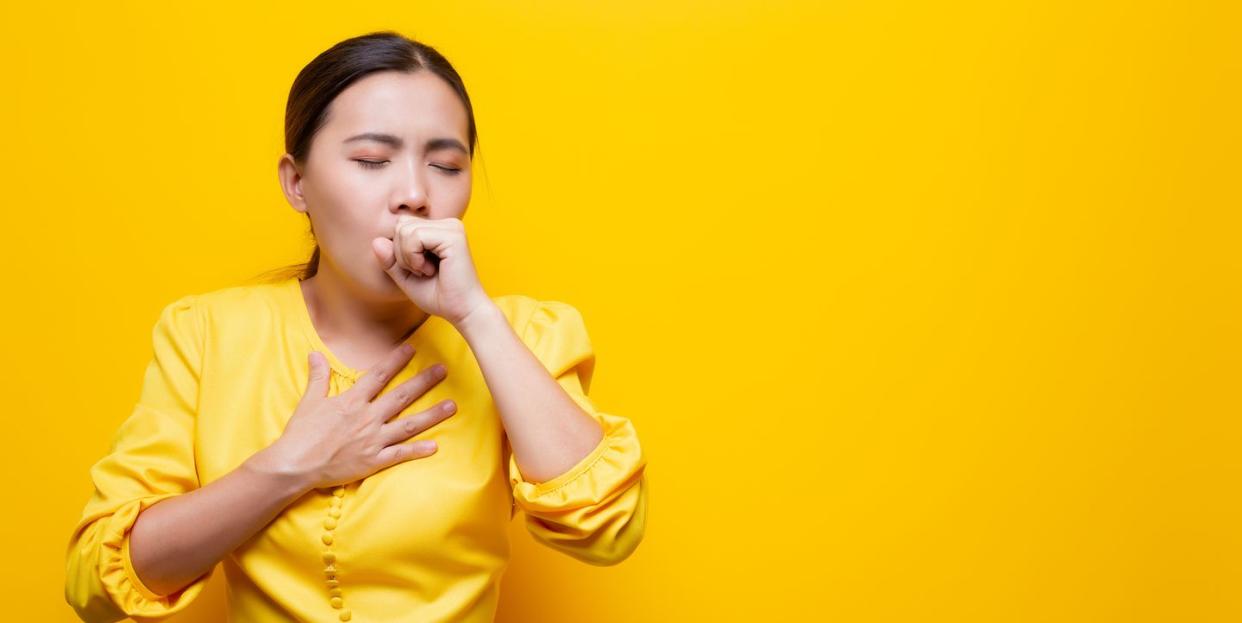Why Do I Cough After I Eat?

Coughing here and there is a normal part of life. But, if you find that you’re regularly coughing after you eat, it’s understandable to wonder what’s going on there.
Turns out, there is a range of factors that could lead to you coughing after you eat and some are more serious than others. Here’s why this might be happening to you, plus what to do about it.
Causes of why you cough after you eat
There are a few potential causes of why you might cough after you eat, including aspiration, aka food “going down the wrong pipe.” Aside from that, experts say these are some of the biggest reasons why you might regularly cough after you eat.
You have a food allergy.
At baseline, a food allergy is when your body’s immune system overreacts to a food or substance in a food, according to the American College of Allergy, Asthma, & Immunology (ACAAI). In that situation, your body identifies the food as a danger and triggers a protective response, the ACAAI explains.
That can cause a slew of different symptoms, the ACAAI says, including:
Vomiting and/or stomach cramps
Hives
Shortness of breath
Wheezing
Repetitive cough
Shock or circulatory collapse
Tight, hoarse throat
Trouble swallowing
Swelling of the tongue
Weak pulse
Pale or blue coloring of skin
Dizziness or feeling faint
Anaphylaxis, a potentially life-threatening reaction that can send your body into shock
The cough itself can be the result of spasms in your esophagus, says Ashkan Farhadi, M.D., a gastroenterologist at MemorialCare Orange Coast Medical Center in Fountain Valley, Calif.
You ate something cold.
Your digestive tract has a lot of nerves in it, Dr. Farhadi says, and cold foods like ice cream and ice water can irritate those nerves. That includes your vagus nerve, which is responsible for the regulation of a slew of bodily functions, including digestion, heart rate, coughing, and swallowing, he says. If you happen to eat or drink something cold “you may start feeling like you need to clear your throat or cough,” Dr. Farhadi says. (For what it’s worth, this can also happen when you eat something spicy, he says.) Luckily, it goes away pretty quickly.
You have asthma.
Asthma is a chronic condition that impacts the airways in your lungs, according to the National Heart, Lung, and Blood Institute (NHLBI). When you have asthma, those airways can become inflamed and narrowed in response to a trigger, making it hard for air to flow out of your lungs when you breathe out.
That can lead to symptoms like chest tightness, shortness of breath, wheezing, and a cough, the NHLBI says. Food isn’t a common asthma trigger but some people may notice that certain foods, like those high in sulfites (a type of preservative) can trigger asthma symptoms, according to the Asthma and Allergy Foundation of American (AAFA). Those can include dried fruits and veggies, packaged potatoes, wine and beer, bottled lime and lemon juice, shrimp, and pickled foods.
“If you eat certain foods, it can activate asthma symptoms right away,” Dr. Farhadi says.
You’re dealing with reflux.
Acid reflux is a condition that happens when the contents in your stomach come back up into your esophagus, the National Institute of Diabetes and Digestive and Kidney Diseases (NIDDK) explains. That can cause a slew of symptoms, the NIDDK says, including:
Heartburn
Regurgitation
Chest pain
Nausea
Issues swallowing
Hoarseness
A cough
“That’s particularly true if you have a bad position after you eat,” he says, like laying down or bending over to clean crumbs off the floor. This can make the contents of your stomach more likely to move into your esophagus, causing irritation and that cough, Dr. Farhadi explains.
You have a swallowing issue.
“Some people cough because of problems swallowing—as soon as they eat, they will have trouble getting food down and may start coughing right away,” Dr. Farhadi says. There can be a range of swallowing issues, but it’s generally known as dysphagia.
Some people with dysphagia can’t swallow anything while others may experience symptoms like pain while swallowing, a feeling that food is stuck in the throat, hoarseness, heartburn, and coughing while swallowing, the Mayo Clinic says.
“Typically, if there’s a cough after eating—not while swallowing—it could be due to post-swallow residue,” says Omid Mehdizadeh, M.D., an otolaryngologist (ENT) and laryngologist at Providence Saint John’s Health Center in Santa Monica, Calif. Meaning, some saliva or food can back up in your throat and cause you to cough.
Treatment for coughing after you eat
Treatment for coughing after you eat largely depends on what’s causing the coughing in the first place, Dr. Farhadi says. If you find that you tend to cough after you eat something cold or spicy, he says this really isn’t something to stress over. “It’s just an innocent reflex,” he says.
But treatment for coughing due to allergies and asthma involves treating the underlying issue, Dr. Mehdizadeh says. Overall, Dr. Mehdizadeh recommends talking to your doctor if you find that you’re coughing after you eat after nearly every meal or if this happens every day. “Contact a doctor after a week to two weeks of this—at the most,” says Neil Bhattacharyya, M.D., a comprehensive ear, nose, and throat specialist at Mass Eye and Ear in Boston.
Dr. Bhattacharyya says your doctor will want to know when, exactly, the coughing is happening (right after you eat or later), along with whether you have any pain. And, if they suspect you have a swallowing issue, Dr. Mehdizadeh says your have you undergo testing, which can include having you swallow a liquid called barium and take X-rays of your throat.
As a whole, though, it’s important to get coughing after you eat checked out—especially if this is happening a lot.
You Might Also Like

